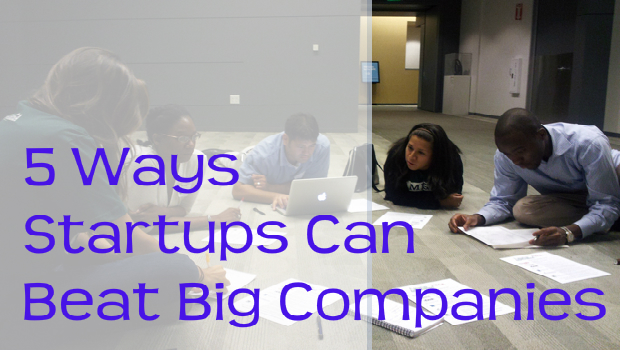
One of the most intimidating things entrepreneurs face is the fact that some of their competitors are massive multi-billion dollar corporations. Everyone knows the story of David and Goliath; occasionally the underdog wins. But in the real world, the giant wins a lot (if not most) of the time.
This was a reality I faced when I started GMM Nonstick Coatings in 2007, a manufacturer of nonstick coatings for cookware, bakeware and appliances. We were a true startup: no employees, clients or products. Our main competitor was DuPont, whose multi-billion dollar brand Teflon has been a household name for decades. Other industry competitors were subsidiaries of global conglomerates with facilities that looked like museums. I remember walking trade shows with a rolling suitcase alone, not being able to get any meetings and wondering what I was thinking.

However, over the last eight years, my partner and I built our company into one of the largest nonstick coatings companies in the world. So how did we do it? Below are five principles that helped us beat our giant competitors:
Related: How Timing Can Make or Break a Startup
1. Be fast
Sure, big companies have big resources. But you know what else they have? Big bureaucracy. In other words, they are SLOW. And if there’s something clients hate, it’s slow service.
We built our company with a culture of lightning fast speed: emails responded to within minutes or hours, samples delivered within weeks instead of months and a team of phenomenal sales and technical personnel who were empowered to make decisions on the spot. Big companies are rarely built to be fast, so use this weakness to your advantage as you create your company DNA.
2. Be relentless
Get used to hearing “no” constantly in the beginning, but don’t lose heart. Keep finding excuses to email or meet potential clients. Sourcing managers are smart, and even if they say no, they remember when a small company is impressive.
Also, many large companies are entitled and take clients for granted. So when you get the tiniest opportunity, kill it with great performance.
3. Never be intimidated
Everyone knows that you are a small company, but you don’t have to act like one. Just because your competition spends hundreds of millions of dollars on R&D or marketing does not mean they are better than you. Hire superstars who know how to develop fantastic products and who are passionate about your business. It shows you’re a true leader.
Exude irrational confidence, be smart, demand execution and believe in the power of self-fulfilling prophecy. If you believe that your larger competitors have no chance to beat you, one day they actually won’t be able to.
Related: Key Rules for Starting a Business on a Shoestring
4. Listen
Huge companies can be surprisingly tone-deaf and may not know (or care) what their clients want. Many times they have off-the-shelf products that they won’t modify even if their clients beg them to do so. As a small business, do the opposite. Create an ethos that’s client obsessed. Customize everything if you can and above all LISTEN to your clients. They will tell you exactly what they want. You just have to deliver. Clients love suppliers who do one thing: solve their problems. And solving problems starts with listening.
5. Understand things don’t happen overnight
It took us eight years to build GMM to the size it is today. However, from the beginning we had a clear vision of where we were going. Don’t get discouraged because the first 10, 20 or 100 sales calls go nowhere. It only takes one break to change everything, and you never know when that break is going to come.
And once that big break happens, work even harder. Take nothing for granted. After a few more big breaks, you will have another problem: You’re not a small company anymore, and you have to learn how to scale. But that’s a conversation for another day.
About Author
 Ravin Gandhi is CEO and co-founder of GMM Nonstick Coatings, one of the world’s largest suppliers of nonstick coatings to the $9 billion housewares industry. Ravin also moonlights as a VC investor and has invested in technology companies such as KeyMe, Tred, Ampsy, Lettrs and Hester Biosciences. Follow @RavinGandhi1
Ravin Gandhi is CEO and co-founder of GMM Nonstick Coatings, one of the world’s largest suppliers of nonstick coatings to the $9 billion housewares industry. Ravin also moonlights as a VC investor and has invested in technology companies such as KeyMe, Tred, Ampsy, Lettrs and Hester Biosciences. Follow @RavinGandhi1
